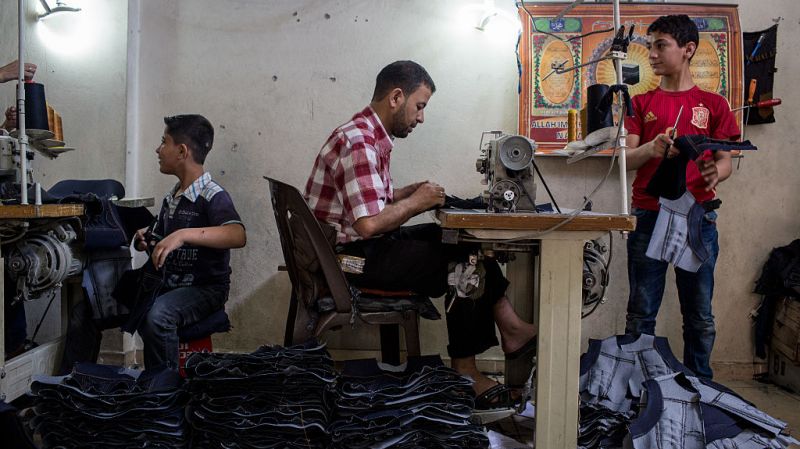A Corporate Watchdog Without Fangs
The Canadian Ombudsman for Responsible Enterprise investigates firms for supply chain abuses. But its biggest impact may be felt elsewhere

Canada’s corporate watchdog, the Canadian Ombudsperson for Responsible Enterprise (CORE), recently launched investigations into Nike Canada, Walmart, Hugo Boss, Diesel and Vancouver-based gold mining company Dynasty Gold. It claims these companies have not done enough to show that their supply chains are free of Uyghur forced labour in China.
The investigations align with the body’s mandate, which is to “hold national garment, mining and oil and gas companies accountable for possible human rights abuses resulting from their operations and supply chains abroad.”
Critics such as the Canadian Network on Corporate Accountability, however, say the watchdog has been ineffective since the Canadian government established it in 2019 — adding that investigations “will likely prove to be fruitless, as the office is still without the power to compel company documents and testimony.”
So, will these new investigations carry any weight? Do bodies such as CORE have any positive impact on multinationals’ behaviour in developing countries?
In this conversation with Smith Business Insight contributor Kristy Strauss, Anthony Goerzen, Sobey Professor of International Business at Smith School of Business, shares his thoughts on CORE and similar national corporate watchdogs, and explains how corruption and ethics are far more complicated than we think.
What are your general thoughts on CORE’s effectiveness as Canada’s watchdog for corporate wrongdoing?
There are many efforts across many jurisdictions to deal with some of the social and environmental issues that are occurring not only inside Canada but also by Canadian firms wherever they operate abroad. There’s a great deal of effort right now being put towards legislation, and organizations like CORE have emerged because governments need to show that they’re doing something.
When somebody believes there are important social or environmental issues associated with a Canadian company abroad, they can alert CORE who will attempt to do an investigation and to publicize their findings — but that’s really where it ends. While it’s better than nothing, it is toothless. The only thing CORE can really do is to try to embarrass companies, to hurt their reputation.
Can bodies such as CORE change anything on the ground?
Oftentimes, there are organizations that are unaware and don’t even have the capability of knowing what social and environmental issues exist along their global supply chain. One thing CORE can do is to alert firms to some of the issues that are in the mix of their operations and beyond. The problem is, it can be extremely challenging to operate in some of these places where local conditions are quite different. Companies sometimes operate where there are no regulations or, if there are rules, it’s not clear if or how they’re being enforced.
Right now, as we speak, groups like the OECD, the United Nations, the U.S. Securities and Exchange Commission, the Canadian government and others are engaged in conversations about social and environmental standards. For example, in Canada, there’s new legislation on “modern slavery” — how to recognize it and what to do about it. CORE could be used to compile information around these issues and questions that we need to understand better.
I imagine CORE could play the role of a so-called clearinghouse of information, research and expertise, which is needed right now because many of the pieces of legislation that are being developed are brand new and have been outside the realm of regulation.
What are the challenges in addressing corporate wrongdoing?
The first challenge is defining what “wrongdoing” is. For example, if a border guard who hasn’t been paid a salary in months asks for a bribe, are they really corrupt? And should they be prosecuted for that? Alternatively, if a senior official demands payment prior to awarding a contract, that surely is quite a different thing. So the concept of wrongdoing is not a simple one.

Second, there is also the notion of colonialism. To what extent do we, as developed and rich countries, have the right to come into other jurisdictions — such as developing countries — to tell them how it’s going to be? There’s an issue around perpetuating colonial thinking that I think we need to reflect on.
Third, if there were social or environmental problems in a particular place where people are poor and desperately need the work, the process through CORE would shame the company operating there. A common response by firms is to exit, to get away from the issues and the accusations of wrongdoing. Similarly, other organizations would hesitate to invest in these troubled places because of the risk of opening themselves to accusations of being anti-social or anti-environment.
A consensus among international development experts is “trade not aid”. In other words, firms should engage and deepen their involvement rather than exiting. Yet, CORE’s approach doesn’t encourage that. In other words, we must find a way to enable organizations to stay and to work within even these most troubled contexts in a way that doesn’t destroy their reputation or subject them to legal issues or court challenges.
How does CORE’s approach and experience to date compare with similar national bodies elsewhere?
The whole world is in the same boat and there is no government or regulator that has figured it out yet. I would say many of the European Union countries are more attuned and maybe have started to take a few more steps towards addressing some of these issues. But nobody knows how to do this. No one has the answer yet.
However, there are many organizations working very hard to try and figure out what the answers are. There are NGOs out there that have very deep experience, and it’s important to draw out what they know and develop or convert that knowledge into legislation as well as lessons for our Commerce and MBA students. The new generation of managers needs to be made much more aware of important emerging issues and those lessons need to be built upon.